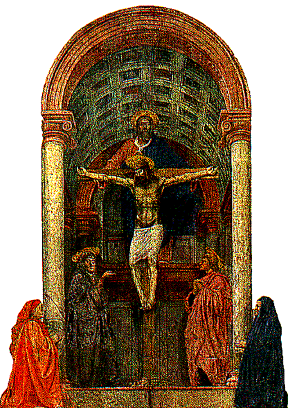
Shown above is Masaccio's painting "The Trinity,"
done in 1427 for the north aisle
of the Dominican Church of Santa Maria Novella in Florence, Italy.
Click here to see a much clearer version.

What do we mean when we say that we believe in a "personal" God or when we say that we believe in One God "in Three Persons"?
For example, do Catholics, or may Catholics, believe that each Person of the Trinity has a gender (i.e., is either masculine or feminine)? Or, inasmuch as both God the Father and God the Holy Ghost are unquestionably solely spiritual persons, and not in any sense material, must Catholics hold that by definition neither can have a gender (i.e., cannot be either masculine or feminine), just as by definition neither can have a sex (i.e., cannot be either male or female)?
Or is "gender" something distinct from sex (independent of corporality)? May it be possible that our recognition that each Person of the Trinity has gender is part and parcel of what it is making us theists as opposed to deists?
Could gender, in other words, actually be an attribute essential to being a person? Could the Bible's Revelation of each of the Persons of the Trinity as "He" be more than metaphor (e.g., the Bible's various references to the snow-white hair and the right hand of God the Father), but instead truly constitute a Revelation ofa truth about God? What, in short, do we mean by the word "person" when we speak of God?
There exists an interesting article, from a liberal perspective, on the meaning of "person" with respect to the Trinity that surveys several of the most prominent Catholic and Protestant theologians of the last century?
I once asked two Orthodox Jewish Rabbis whether God had or could have gender. They both stated that the Jewish position is simply that the Torah speaks of God as "He" and, therefore, Jews speak of God as "He." To go beyond that, and contend over whether God is masculine, would at best be idle and probably be blasphemous. They added, though, that not to refer to God as "He" but instead to use other pronouns would also be blasphemous. The Torah rules.
This Orthodox Jewish position, which I think is shared by the Eastern Orthodox Christians, is coherent, logical, and modest. We Latin Westerners, however, have a craving for probing and defining. Therefore, in our Tradition, investigating the nature of the Godhead has never been considered automatic blasphemy.
There are very few positions possible regarding the Godhead and gender.
The first position is not self-evident. Why cannot God have gender? We have no Revelation saying so God has no gender, while we do have Revelation that speaks of God as "He". Of course, if having a physical body were essential to having gender, God by definition cannot have gender. But if having a physical body is necessary to having a gender, than whay about all the souls of the dead now in Hell, Purgatory and Heaven awaiting the Last Judgment. Do they lack gender?
What is gender anyway? I will be the first to admit I have no idea. Almost everything usually meant when talking about gender is either derived from sexual identity or just culturally derived (e.g., assertiveness, nurturing, aggressiveness, passiveness, etc.). If such is all there is to being either masculine or feminine, then clearly God has no gender. But what if there truly is more and what if, while we humans may not (yet?) be able to define it, we are still able to sense that there is more? After all, it was only a short time ago that no one knew of such things as genes, X and Y chromozomes, hormones, etc., things which we all know now to be essential to sexual differentiation. Perhaps it awaits us to learn a whole lot more about what it means to be a person, i.e., to be a subject rather than an object, and perhaps someday we will learn that gender distinctions are indeed essential to being a person.
One interesting sidelight is the language the Bible uses when it says humans were made in the image and likeness of God. The first chapter of Genesis has the famous statement translated by St. Jerome from the original Hebrew into Latin as: "et creavit Deus hominem ad imaginem suam ad imaginem Dei creavit illum masculum et feminam creavit eos." (Gen i: 27), which the Douay Bible translates into English as: "And God created man to his own image: to the image of God he created him: male and female he created them."
The fifth chapter of Genesis has a parallel statement, which St. Jerome translated as: "masculum et feminam creavit eos et benedixit illis et vocavit nomen eorum Adam in die qua creati sunt" (Gen. v: 2). The Douay Bible renders this as: "He created them male and female; and blessed them: and called their name Adam, in the day when they were created.".
It is interesting that St. Jerome chose to use "masculum" and "feminam" but that the Douay Bible translates his "masculum" as male, and not masculine, and translates his "feminam" as female, and not feminine. Why was this? The Latin and English languages, after all, have always had distinct words for man and woman ("vir" and "mulier"), manly and womanly ("virile" and "mulierile"), and for masculine and feminine ("masculus" and "femina"), and male and female (" " and " "). In St Jerome's day and in King James's day,where all these words for the two sexes and genders interchangeable? Or were there even then subtle distinctions?